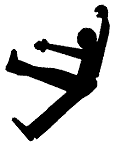Preventing falls in the elderly
 Back in 2004, Dr. John Chang from the David Geffen School of Medicine in Los Angeles reported, “Interventions to prevent falls significantly reduce the proportion of older people who fall at least once.”
Back in 2004, Dr. John Chang from the David Geffen School of Medicine in Los Angeles reported, “Interventions to prevent falls significantly reduce the proportion of older people who fall at least once.”
Reviewers since then have disagreed.
First, the details.
- A systematic review revealed 40 studies where the data could be combined and reanalyzed as part of a meta-analysis.
And, the results.
- A multifactorial falls risk assessment combined with a management program was the most effective way to reduce the risk of falling.
- 11 patients would have to be treated to prevent a fall in 1 person.
- Exercise had a beneficial effect on the risk of falling, number needed to treat (16) to prevent 1 person from falling.
Although a 2003 Cochrane review concurred that interventions to prevent falls are now available, in the past year, 3 other reviewers have come to different conclusions.
Community-dwelling older persons
- 83 studies were reviewed.
- Less than one-third used statistical tests to analyze the results.
- The reviewers from the US and Canada recommended “researchers and clinicians seek consultation with a statistician with expertise in recurrent event methodology.”
Patients in acute- and chronic-care hospitals
- Belgian and Swiss researchers reviewed 8 studies.
- A meta-analysis found no evidence that hospital fall prevention programs reduce the number of falls or fallers.
Older people in community and emergency care settings
- Data from 19 studies were combined for a meta-analysis.
- No differences were found in hospital admissions, emergency department attendance, death, or move to institutional care.
- Locations, populations selected for high risk of falls, and multidisciplinary teams did not alter the results.
- The UK reviewers concluded that programs that provide treatments might be more effective than those that provide only knowledge and referral.
The bottom line?
There’s a tendency to place greater weight on newer study results. But older studies are sometimes more informative. I got the impression that the message being sent by more recent reviewers is directed at researchers to do better studies, rather than to clinicians, care givers, and patients on how to improve their situation.
Rather than do nothing or wait for the perfect study, these recommendations from Cochrane in 2003 for elderly people living at home or in residential institutions might be useful.
- Screening plus programs for older people, especially those with a history of falling, risk factors, and living in residential care facilities.
- Muscle strengthening and balance-retraining programs developed by healthcare professions for home use.
- Home hazard assessment and modification for older people with a history of falling.
- Stopping psychotropic drugs.
- Cardiac pacing for fallers with cardioinhibitory carotid sinus hypersensitivity.
- 15-week tai chi group exercise.
2/16/09 17:51 JR